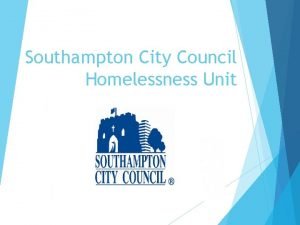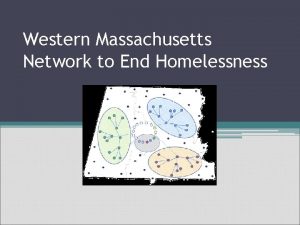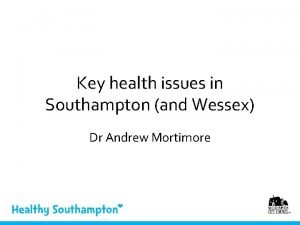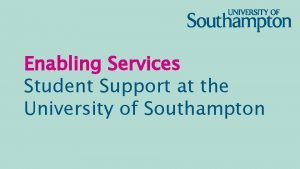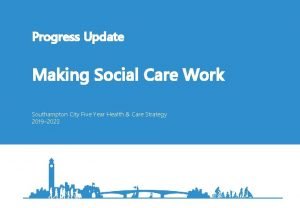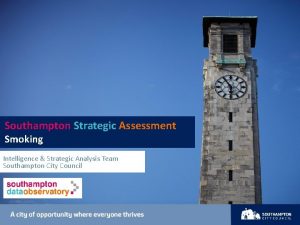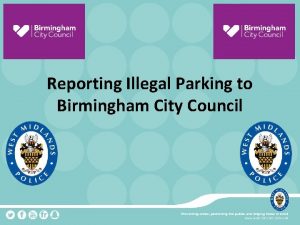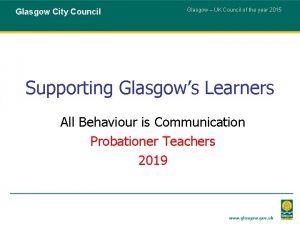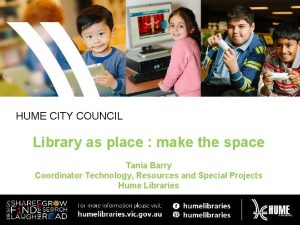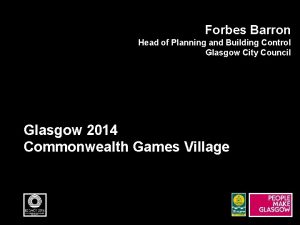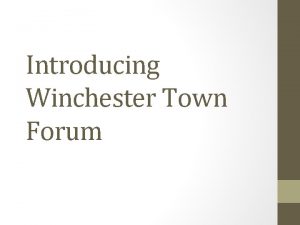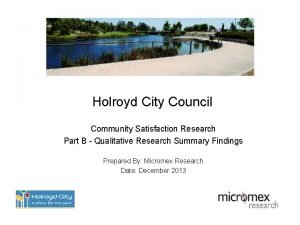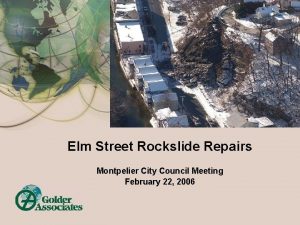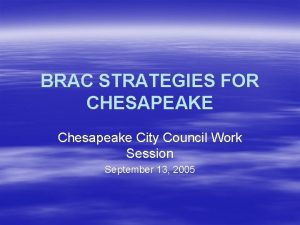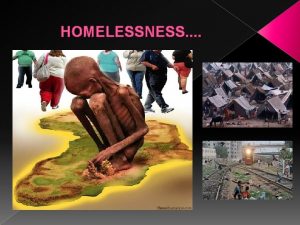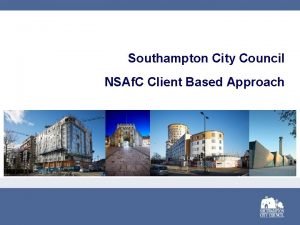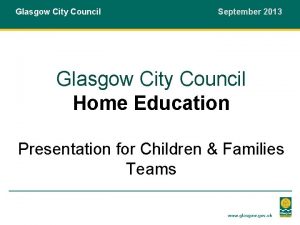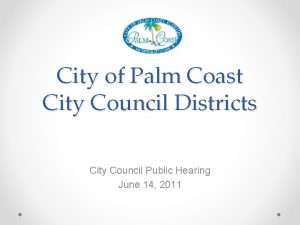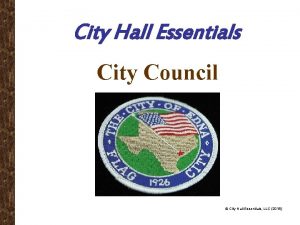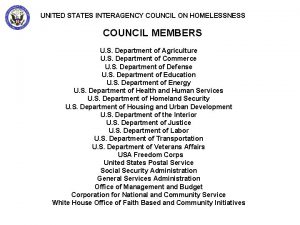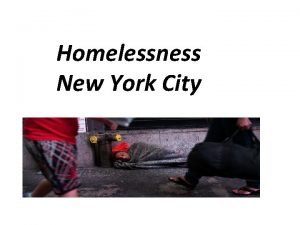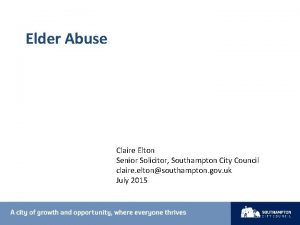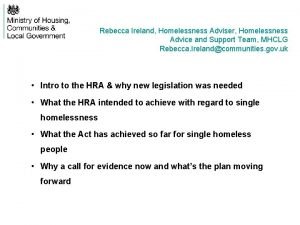Southampton City Council Homelessness Unit The Homelessness Unit







































- Slides: 39

Southampton City Council Homelessness Unit

The Homelessness Unit is formed by 5 teams: Ø Ø Ø Homelessness advice service Homelessness Outreach Mediation Team Homeseekers Letting service Welfare Rights and Money advice service Street Homeless Prevention Team The Street Homeless Prevention team joined the council in 2011 from the voluntary sector

Street Homeless Prevention Team (S. H. P. T. )

We aim to minimize the need for anyone to resort to sleeping rough Ø Meet and support individuals, in Southampton, who are street homeless or are imminently at risk of street homelessness Ø Assist people sleeping rough to exit a street lifestyle by accessing appropriate services to meet their needs Ø Support individuals in the positive choices they make that prevent them from returning to the street Ø Reconnect people, where appropriate, to their local area so that they can access the most appropriate services to meet their needs

If this is your normal workplace…

This is ours!

Hostel Referral Session Ø Hostel Referral session started in 2006 -2007 Ø The reason for this was that the most vulnerable rough sleepers were sometimes being overlooked and not prioritised for vacancies. Ø An equal and fair assessment service was needed and so the hostel Referral session were born

Who can present? Ø Anyone who is single, aged 18 -60 years old, and is homeless can present at the Day Centre at 30 Cranbury Avenue in Nicholstown Ø The sessions operate on a Monday, Wednesday and Friday morning from 9 am – 11 am Ø On arrival the triage worker will do a brief homeless assessment and sign post the service user to the correct service.

Complex Cases Intensive Panel – weekly meeting with intensive housing providers to discuss complex client allocations R. I. C. C. (Revolving Intensive Complex Clients) Quarterly meetings held with all providers to discuss our most complex clients to draw action plans and prevent revolving door scenarios

Services offered Ø Street Homeless Prevention Team - If the service user is homeless with issues with Alcohol, drugs, mental health / physical health or are sleeping rough they will be directed to SHPT for an assessment and a discussion around housing options with a possible referral to the assessment centre at Patrick House. Ø Private Rented - If the service user is homeless but has no presenting issues and has managed a tenancy they will be sign posted to the private rented accommodation worker who will assess them and work with the person to acquire private rented accommodation.

Continued… Ø Family Mosaic - If the service user has accommodation but is having difficulties with their tenancy the SU will be sign posted to Family mosaic floating support. Ø EU Welcome – migrant workers can get help with I. D, relocation, benefits, job finding and referrals for private rented accommodation. No Local Connection Policy If a service user has no local connection to the city the S. H. P. T. will contact the LA from which the person has come from and will be offered the relocation service under the governments “no second night out”.

Services of the Day Centre The day centre is open from 9 am – 4 pm Monday to Friday and can offer the following services: Food – the day centre has a dining room where you can have a tea/coffee, cooked breakfast from 9 am 10 am and a cooked lunch from 12. 30 -1 pm (all very low cost) Clothing store/showers – accessed by anyone and is stocked by donations of clothes, soap, toothpaste, razors and towels, from the public and local companies. Laundry Service – this service can be accessed by homeless people and is generally a 24 hr turn around service. Telephone – can be used to contact landlords, benefits etc.

Outreach

Normally we carry out 2 outreach session a week from 6. 30 to 8. 30 am Ø To know who is street homeless in our city not just begging Ø To assess priority and need Ø To sign post new rough sleepers to appropriate services before they become entrenched Ø To encourage entrenched rough sleepers to access services Ø To gather statistics of street homelessness in Southampton

The Myth Ø Ø Ø In our experiences, 70% of those begging are not street homeless 80% of money gained on begging goes on drugs alcohol and gambling A low level drug habit will need £ 20 heroin + £ 10 crack +£ 10 strong larger a day on top of a methadone script = £ 280 a week. Begging around Christmas can make between £ 50 - £ 200 a day

Seasonal variation Ø Christmas brings people from out of area to beg in Southampton. Ø Our average street homeless count is between 9 - 15 Ø During winter we operate a Severe Weather Emergency Provision (S. W. E. P) Ø In the summer numbers increase due to summer music festivals and it isn’t as cold to sleep out.

EEA (European Economic Area) Homeless Ø Over the last 10 years our number of EEA nationals who are sleeping rough has increased, Ø At one point last year we were seeing 16 EEA nationals sleeping rough in the rose gardens Ø With intervention from The Home Office, Police and SHPT over 75 have been removed from Southampton during the last five years. Ø If we did not remove EEA nationals who are not exercising their European treaty rights we would have a significant homeless issue in Southampton. The cost to Southampton City is very high as one person had 125 admissions to hospital over a 8 year period for alcoholism

EU Welcome Ø For those EEA which are struggling with work, identification and benefits entitlement they can attend a session at the day centre for advice. Ø For those who can no longer support themselves are offered assistants to return to their country of origin

S. H. P. T. Intensive Support Service.

The Housing First Model ‘Housing First Models are founded on the principle of housing being a basic human right and provides permanent accommodation for people straight from the street or those that have experienced repeated homelessness. The model does not require people to address their wider social care and support needs either prior to or whilst in their long term accommodation. People are only required to meet the terms of their tenancy agreement (as would any member of the general public) and are given intensive support to do so which is separate to the housing management function. ’ The Street Homeless Prevention Teams Intensive support service was not created direct from the housing first model, it however does have links and shared principles.

Principles of Housing First Model Immediate (or relatively immediate) permanent accommodation is provided to the service user directly from the streets without the requirement of assessed housing readiness. No preconditions of treatment, access or engagement are made (housing first, not treatment first). Comprehensive support services are offered and brought to the service user. A harm reduction approach is taken to the dependency issues and abstinence is not required, however the support agency must be prepared to support residents commitments to recovery. Support can ‘float away’ or return as needs arise and the housing is maintained even if the resident leaves the program, e. g. through imprisonment or hospital admission.

Referral Agencies

Criteria to Access the Service Ø Client has a history of homelessness and is known to services Ø Client has stayed in homeless services in the past OR is in a hostel and need to intensive support to be able to move on to different accommodation Ø The client demonstrate some level of willingness to engage (low threshold) Ø The client has complex needs such as drug, alcohol, mental health or behavioural issues Ø The client has had a failed tenancy OR being evicted from homeless accommodation within the last 12 months or has been refused accommodation with homeless service Ø The client is at risk of homelessness from long term housing such as SCC or H. Ass due to complex issues i. e. hoarding, non engagement with housing services, mental health etc. .

Support Work Ø Intensive support (approx. 6 to 8 weeks; however it is not necessarily time bound; clients are reassessed on a regular basis in view of referring them to other services) Ø Referred to Family Mosaic Floating Support Ø Begin joint support with Family Mosaic floating support – joint work will take place until taken over by Family Mosaic Ø Financial support e. g. help clients in budgeting, dealing with benefits, making use of Hampshire Credit Union Jam Jar account in anticipation of Universal Credit

Continued… In a very broad sense we offer any support that would prevent homelessness, this includes support that is not only housing related: Ø Practical support 1 e. g. cleaning the flat, de-cluttering, arrange repairs and attend repairs, moving personal belonging from one property to another, help with furniture and anything needed etc. . Ø Practical support 2 e. g. booking and attending appointments with doctors, specialists, job centre plus, citizen advice bureau etc… Ø Mediation with landlord around issues of anti-social behaviour, repairs, rent arrears etc… Ø Organization of multi-agency meetings to co-ordinate multi-agency support; prevention of risk/safeguarding prevention Ø Access to therapeutic services e. g. NHS Steps to Well Being, NHS College Keep etc… Ø Emotional support – providing clients with a consistent presence that helps building positive relationships of trust; offering quality time to the clients to talk about their issue in a safe environment – engaging clients in social and educational activities

Risk of Lone Work Ø The team is always keen to double up and work in pairs on single cases Ø We currently also use the ‘Jon tech’ lone worker system. Ø The team is keen in carry out joint work with other agencies to support clients – this happens on a regular basis and also involved going on joint visits with clients

Data collection and analysis The data has been extracted from the Homelessness unit casework database. The data is one officer case load for 25 months (03/2013 - 04/2015) 51 cases were opened during this period … Of these, 19 were opened before the review dates, 9 cases are still ongoing Cases are closed and re-opened in periods of chaos/crisis. On average cases are re-opened 2. 5 times, some cases have been known to be open as many as 7 times. The average number of contacts per clients is 24. 5

Clients profile



Makeup of needs of clients include:



Geographical location of clients

Outcome Our main aim is for our client to remain in accommodation, 36 (71%) of the 51 closed cases from the review period are still living in independent accommodation. This was confirmed through checking Housing Benefit records. Additional benefits of support that have been highlighted include: Reduced amount of contact with emergency services. Increased number of clients accessing additional services. Increased engagement with outside support agencies.

Costs of accommodation The cost of SHPT Intensive support can range from £ 500 to £ 1000 for a 6 week period of support depending on the level of support that is required. The cost of living in Intensive support hostel can range between £ 250 and £ 285 per week. The cost of living in a Life skills plus hostel ranges between £ 170 and £ 196 per week. Current local housing allowance for a room in a shared house -£ 67. 87 per week. Current local housing allowance for a one bed private flat - £ 116. 53 per week In terms of eviction Shelter (2012) highlight the average total cost of an eviction from a Local Authority tenancy as £ 5, 800 (including cost of eviction, arrears write offs and cost of re-letting) and an eviction from a private rented tenancy can cost the local authority on average £ 2, 500.

Other costs potentially incurred by this client group A single arrest costs the Police service an average of £ 1, 668. A conviction of shoplifting is estimated at £ 3, 500 A drug offence conviction is estimated at £ 16, 000 A single visit to A&E costs the NHS £ 147 A short stay in hospital on average costs £ 586

Case Study. 53 year old female. Long term history of Mental Health Previous evictions from Privately rented and Social housing. History of street sleeping, and non engagement with services. Very specific views on suitable accommodation. Provided suitable Temporary accommodation, then moved to long term (over 4 years now) Provided Intensive support, highlighted need for mental health services as dramatic physical and mental health deterioration Property has been maintained whilst in psychiatric unit of hospital

You can contact us: Ø by email at streethomeless@southampton. gov. uk Ø by calling 023 8083 2343 Ø by meeting us at the Cranbury Avenue Day Centre Monday, Wednesday and Fridays between 9. 30 am and 11 am Seen someone sleeping rough? Ø If you would like to report someone you have seen sleeping rough, you can email us at streethomeless@southampton. gov. uk. We need to know: Ø the location of the rough sleeper Ø dates and times you have seen the person here Ø your contact details in case we need to contact you for further information
 Street homeless prevention team southampton
Street homeless prevention team southampton Scc agresso payment
Scc agresso payment Western mass network to end homelessness
Western mass network to end homelessness Pgrtracker
Pgrtracker Eprints southampton
Eprints southampton Southampton township school district
Southampton township school district Population of southampton 2021
Population of southampton 2021 Southampton county, virginia plantations
Southampton county, virginia plantations Southampton enabling services
Southampton enabling services Sussed soton login
Sussed soton login Vevox southampton
Vevox southampton Southampton geothermal heating company ltd
Southampton geothermal heating company ltd Matt ryan southampton
Matt ryan southampton Dimensions southampton
Dimensions southampton Mike santer
Mike santer Southampton actuarial science
Southampton actuarial science Nick evans southampton
Nick evans southampton Will baker southampton
Will baker southampton Southampton education school
Southampton education school Eprints southampton
Eprints southampton Agresso southampton
Agresso southampton Southampton county social services
Southampton county social services Swarthling
Swarthling Gradbook southampton
Gradbook southampton Agresso southampton
Agresso southampton Report illegal parking birmingham
Report illegal parking birmingham Works perks nottingham city council
Works perks nottingham city council All behaviour is communication glasgow city council
All behaviour is communication glasgow city council Orb edinburgh
Orb edinburgh Ihealthevents
Ihealthevents Hume city council library
Hume city council library Forbes barron glasgow city council
Forbes barron glasgow city council Nezhin nizhyns'ka city council, chernihiv oblast, ukrajina
Nezhin nizhyns'ka city council, chernihiv oblast, ukrajina Richard brown glasgow city council
Richard brown glasgow city council Kevin rush glasgow city council
Kevin rush glasgow city council Brisbane city council compost caddy
Brisbane city council compost caddy Winchester city council meetings
Winchester city council meetings Holroyd city council
Holroyd city council Montpelier city council
Montpelier city council Chesapeake city council meeting
Chesapeake city council meeting
